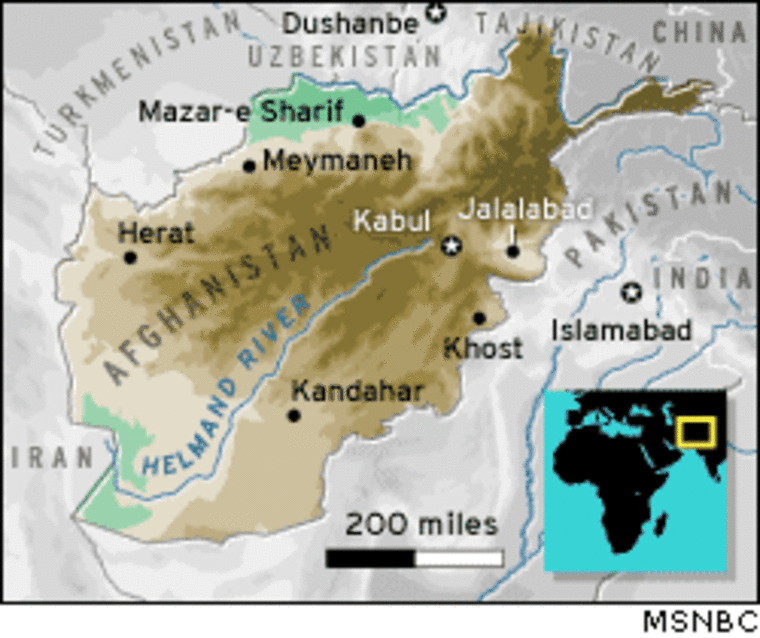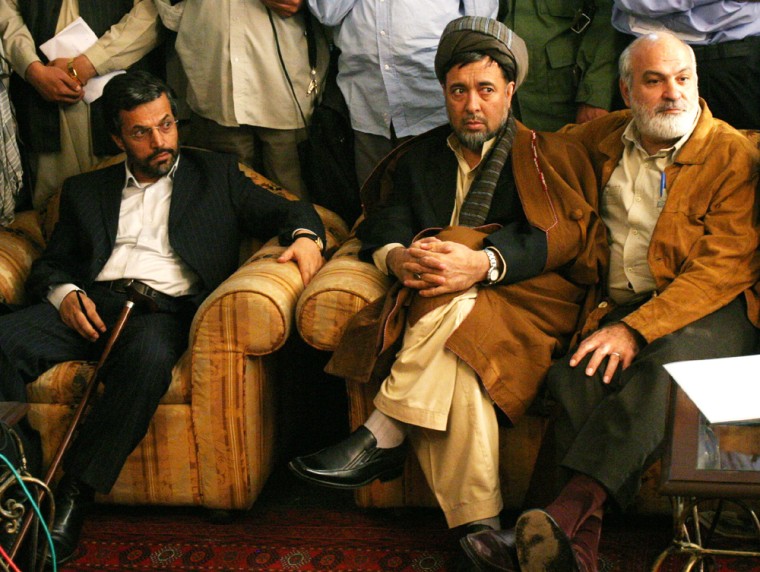Twelve out of 17 opponents of Afghanistan's President Hamid Karzai in the upcoming October presidential elections repeated their call for his resignation on Thursday, accusing the interim leader of misusing his presidential power, government funds, and facilities to promote his candidacy for president.
Earlier in the week, Karzai’s opponents had threatened to withdraw from the elections if Karzai did not resign.
But on Thursday — at a news conference at the Intercontinental Hotel in Kabul — they failed to agree on the boycott, saying they will postpone their decision for one more week.
The opposition candidates are mostly mujahedeen or militia commanders, many of whom have their own ethnic or tribal power base.

Only one, former Education Minister Yunus Qanooni, who has strong support within the former Northern Alliance, is considered to be a serious challenge to Karzai.
Massouda Jalal, the only female candidate, did not attend the meeting.
Ahead of the news conference, there was speculation they would either announce a withdrawal from the race or unite behind a single candidate to contest Afghanistan’s first democratic election.
But the meeting dragged on and, after five hours hanging out in the lobby, the waiting journalists issued their own ultimatum: “Five more minutes or we leave!”
No united front
When the opposition candidates finally re-appeared, it was clear that they were unable to present a united front.
Instead, a spokesman, independent candidate Homayoon Shah Asifi, read a statement accusing Karzai — the clear front-runner — of using the Home Affairs and Tribal ministries for campaign meetings, and taking unfair advantage of local television and radio to further his campaign.
Karzai, for his part, said on local radio he has no intention of resigning, and even if there were only one candidate left, the election would go on. He said it was his constitutional right and duty to stay on as president until the inauguration of the president-elect.
But one of the candidates, Abdul Hafiz Mansoor, maintained that Article 161 of the constitution — the clause that states that the interim president can stay in office until the elected president is installed — was a late addition slipped into the text after it was drafted and approved by the gathering of Afghan leaders, known as the Loya Jirga, in January.
The 12 presidential opponents said they would investigate Article 161 and challenge the legality of the clause if Mansoor’s accusation is borne out.
Afghans ready to vote
As of Aug. 21, more than 10 million Afghans had registered to vote. Forty-one percent of those registered are women and the count is not yet finished.
Across Afghanistan there will be 5,000 polling centers where people can vote, each with five polling stations. Some 120,000 Afghan election workers will staff the polling centers.
Men and women will vote at separate polling stations and, in order to avoid multiple voting, each voter will have his or her finger marked with ink that cannot be washed off for a week.
U.N. special envoy Jean Arnoud reported to the Security Council on Wednesday that the campaign to register Afghans for the elections has been a success. But he also warned that the Taliban is regrouping and planning attacks to disrupt the Oct. 9 elections.
Arnoud said violence could cause people to stay away from polling stations, and security forces, both domestic and international, will be stretched thin to protect all 5,000 sites across the country.Security for the election will be the responsibility of the Interior Ministry, some 20,000 German and U.S.-trained Afghan police, and 25,000 U.S. and NATO troops.
